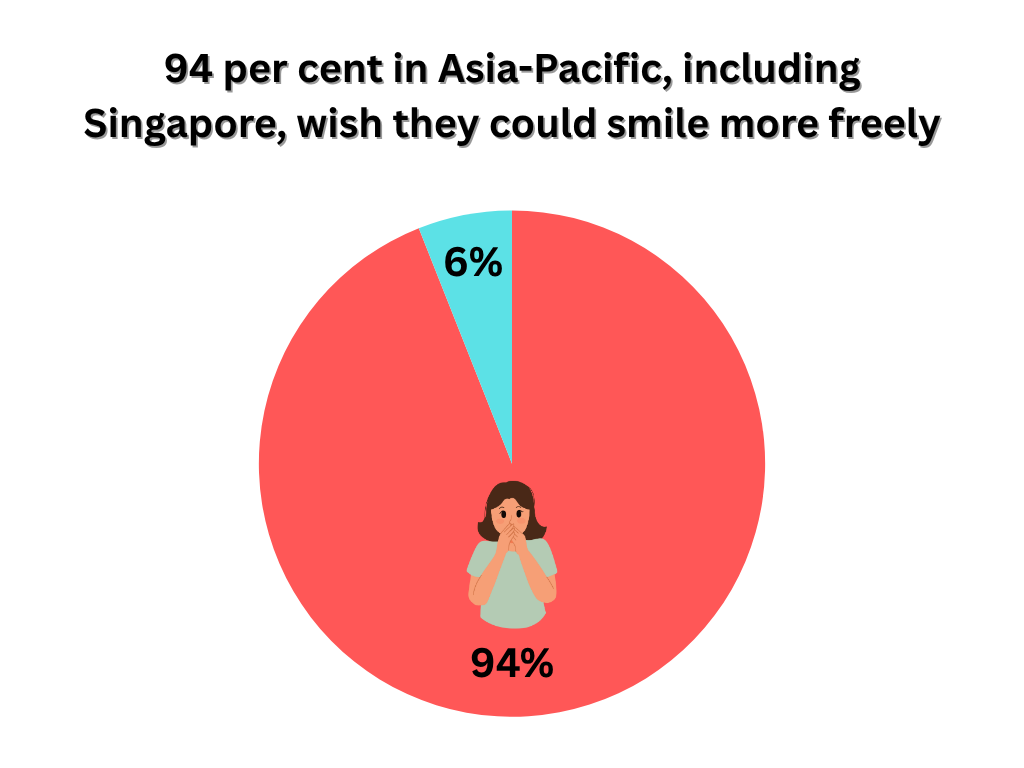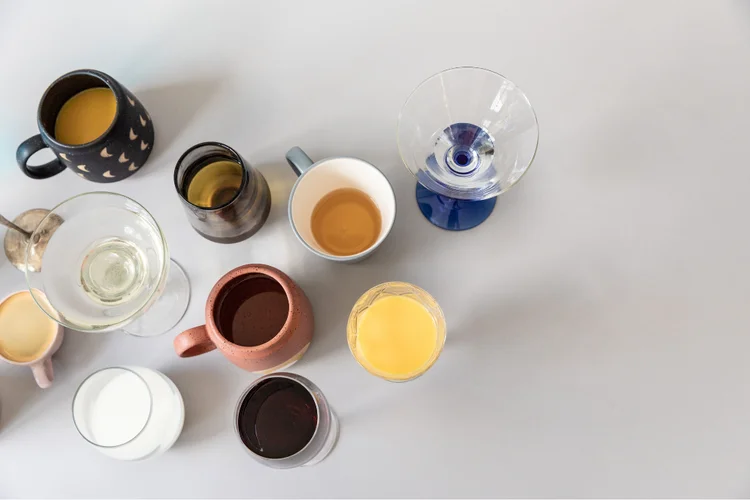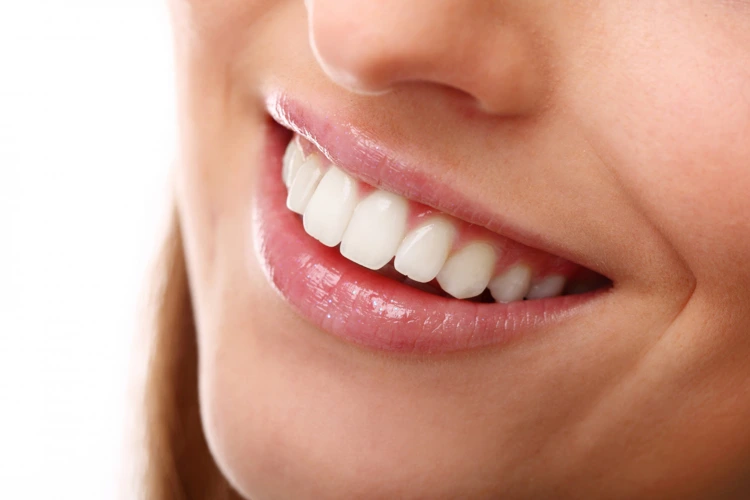Teeth Whitening Singapore
Information reviewed by: Dr. Tay Chih Kien, B.D.S (Singapore) | Last updated: Nov 03, 2025
A bright, confident smile can leave a lasting impression. If you feel self-conscious about
stained or discoloured teeth, you are not alone. In Singapore and across Asia-Pacific,
94 per cent of people wish they could smile more freely.
Discolouration, whether caused by daily habits or natural ageing, can make it harder to smile or
speak comfortably in social and professional settings. Luckily, there are effective
options available to help restore the natural whiteness of your teeth and, in turn, your
confidence.
At True Dental Studio, we provide professional teeth whitening services, whether you prefer an
in-clinic treatment ($1,308) or the convenience of a home whitening kit
(from $359.70).

Source: Colgate Smile Study 2023
WhatsApp Us Now
What Stains Teeth?
Teeth can become stained for various reasons, and it’s not always due to poor oral hygiene. Common causes include:
- Food and Drink: Certain foods and beverages, such as coffee, tea, red wine, and dark berries, contain chromogens which are pigmented compounds that cling to enamel and cause stains. Additionally, some of these items contain tannins and/or are acidic, which can erode enamel and increase the likelihood of discoloration and staining.
- Tobacco Use: Smoking or chewing tobacco introduces tar and nicotine, which lead to stubborn yellow or brown stains.
- Ageing: As enamel wears down with age, the yellowish dentin beneath becomes more visible, giving teeth a duller appearance.
- Poor Oral Hygiene: Infrequent brushing and flossing allow plaque and tartar to accumulate, causing discolouration.
- Medications: Certain antibiotics like tetracycline can cause intrinsic stains during tooth development, and other medications like antihistamines can also affect tooth colour.

Types of Teeth Stain
Teeth stains can be classified into two main categories: extrinsic and intrinsic.
- Extrinsic Stains: These form on the tooth surface and are usually caused by external factors like food, drink, or smoking. They are often easier to treat with regular cleaning or over-the-counter whitening products.
- Intrinsic Stains: These occur within the tooth, typically due to ageing, medication use, or trauma. Intrinsic stains are harder to remove and often require professional whitening.
- Age-Related Stains: A combination of extrinsic and intrinsic factors, where enamel wears down over time, revealing the yellowish dentin beneath, making teeth look duller.
Why Go for Professional Teeth Whitening?
You may be curious about the benefits of professional teeth whitening performed by a dentist, especially when there are many over-the-counter (OTC) options such as whitening toothpaste or mouthwash available. Here are some important reasons to consider choosing professional treatment:

A Brighter Smile
Professional teeth whitening treatments are customised to meet your specific needs, often delivering more significant and noticeable results. These treatments are more effective at targeting deep-seated intrinsic stains compared to OTC products, helping you achieve a whiter and brighter smile that enhances your overall appearance.
Professional & Monitored Process
When you choose professional whitening with custom trays or in-clinic treatment, the procedure is conducted under the supervision of trained dental professionals and is generally considered safe. They will guide you through the process, provide personalised advice, and address any questions or concerns you may have.
Quick, Visible Results
Professional in-office whitening can provide noticeable results after just one session. Depending on the severity of your stains, you may achieve several shades lighter in a single visit, allowing you to enjoy a more radiant smile in a relatively short amount of time.
Long-Lasting Results
While OTC products may provide only temporary improvements, professional whitening treatments can offer longer-lasting results. With proper care and maintenance, your brighter smile may last for several months or even years.
Teeth Whitening Before and After
As per Ministry of Health (MOH) regulations, we are unable to publish before-and-after photos on our website. However, you may request to view photo examples during your consultation, and our friendly dentist will be happy to share these to help you envision your brighter smile.
Teeth Whitening Singapore Price
At True Dental Studio, we specialise in aesthetic dentistry, with prices for our teeth whitening treatment as follows:
| Treatment | Price* |
|---|---|
| Consultation | $27.25 to $65.40 |
| Removal of Dental Stains | From $49.05 |
| Home Teeth Whitening Treatment | $499 |
| In Clinic (Philips Zoom) Whitening Treatment | $999 |
| In Clinic (Philips Zoom) + Home Whitening Treatment | $1299 |
| Whitening Gel Only | $218 |
*Prices are NETT and inclusive of GST.
How Do I Book a Teeth Whitening Appointment?
Book Teeth Whitening Appointment
Book NowEnquire More Through Email
Email Us NowEnquire More Through WhatsApp
WhatsApp Us NowWhy Choose True Dental Studio?
Friendly Dentist and Team
Our team treats each and every patient to the best of our ability. This is the reason why entire families have continued their dental care with True Dental Studio for many years, from all over Singapore.
Minimal Discomfort
At True Dental, it is our commitment to ensure our patients are kept as comfortable as possible. We aim to minimize discomfort, if any, for our patients.
Affordable Treatments
We believe in pricing quality treatments at a competitive rate. We are transparent and upfront with our treatment costs.
Our Smile Scorecard
Frequently Asked Questions
Yes, professional teeth whitening at the dentist is generally more effective and consistent. Dentists offer both customised take-home trays and in-clinic treatments, using stronger whitening agents that can be tailored to your specific needs. This ensures even whitening results and helps minimise risk of gum irritation or sensitivity.
Yes, dentist-supervised whitening is generally more effective than at-home products. Dentist treatments use higher-strength whitening agents and are applied professionally or with guided supervision, resulting in faster, more effective, and consistent whitening.
Professional teeth whitening at the dentist is more expensive because it involves advanced equipment, high-quality materials, and a customised approach supervised by trained professionals. Many people find it worth the investment for the effective, consistent, and longer-lasting results.
Professional teeth whitening results can last from six months to up to two years, depending on lifestyle factors such as diet, smoking, and oral hygiene practices.
Coke contains dark pigments and acids that can erode enamel and allow stains to adhere to your teeth. The high sugar content also contributes to plaque buildup, which can exacerbate discoloration.
White stains on teeth can be caused by various factors, including demineralisation (often due to poor oral hygiene), excessive fluoride exposure (fluorosis), or trauma to the teeth.
To treat white stains, options include professional teeth whitening, micro-abrasion, or cosmetic dental treatments like bonding or veneers. It's best to consult a dentist for tailored recommendations.
Stains can often be removed through professional dental cleanings, whitening treatments, or using whitening toothpaste and mouth rinses. Good oral hygiene practices, including regular brushing and flossing, can also help.
To clean stains between teeth, regular flossing is essential. Interdental brushes or water flossers can also be effective. Professional dental cleanings may be needed for stubborn stains.
To minimise coffee stains, consider drinking it through a straw, rinsing your mouth with water after consuming coffee, or brushing your teeth shortly after drinking. Opting for lighter-coloured coffee can also help.
Deep stains often require professional treatment, such as in-office whitening or dental veneers. Home whitening kits may help, but results vary based on the severity of the stains.
Yes, coffee can stain teeth due to its dark pigments and acidity, which can lead to the yellowing of enamel over time.
Absolutely, yellow teeth can often regain their brightness with the right whitening treatment. Professional options, such as dentist-provided whitening trays or in-clinic treatments, are designed to offer effective, consistent, and longer-lasting results. Keep in mind, though, that outcomes may vary depending on the underlying cause of the discolouration.
While white coffee is generally lighter and may cause less staining than regular coffee, it can still contribute to tooth discoloration, especially if consumed frequently.
To prevent staining, limit your coffee intake, rinse your mouth with water after drinking, use a straw, and maintain good oral hygiene practices, including regular brushing.
Cons of teeth whitening can include temporary tooth sensitivity, gum irritation, and, in rare cases, uneven whitening due to the chemicals used in whitening agents. Overuse or misuse of these teeth whitening products can also weaken enamel over time.
Yes, professional teeth whitening is generally more effective and consistent. Dentists offer both customised take-home trays and in-clinic treatments, which are professionally applied or provided with guidance, helping to reduce the risk of sensitivity and gum irritation.
Teeth whitening is generally not painful, but it can cause temporary sensitivity in some individuals. Professional treatment such as custom-fitted trays prescribed by dentists or in-clinic treatment can help minimise the risk of sensitivity and gum irritation.
In-office whitening treatments at the dentist offer the fastest results, often achieving noticeable whitening in a single session. This speed is due to the use of high-concentration whitening agents, which are professionally applied and activated, sometimes with special lights or LEDs that enhance the whitening effect.
Yes, yellow teeth can often become white again through whitening treatment. Professional options like dentist-provided whitening trays or in-clinic treatments can deliver effective, consistent, and longer-lasting results. However, outcomes may vary depending on the cause of the discolouration.
Baking soda has mild abrasive properties that may help remove surface stains, but it does not provide the same level of whitening as professional treatments and can potentially damage enamel.
Brown stains can be caused by various factors, including food and drink (such as tea and coffee), tobacco use, poor oral hygiene, and certain medications. They may also indicate tooth decay or demineralisation.
Turmeric can stain teeth due to its vibrant yellow pigment. However, it is also used in some natural whitening remedies.
Yes, herbal teas can stain teeth, particularly those with strong pigments, like hibiscus or black teas. Even lighter herbal teas can contribute to staining over time.
To remove coffee stains, consider professional dental cleaning or whitening treatments. Regular brushing with whitening toothpaste can also help minimise stains.
Both coffee and tea can stain teeth, but tea, especially black tea, may be more likely to cause discoloration due to its higher tannin content.
To remove braces stains, consider professional cleaning and whitening treatments. Maintaining excellent oral hygiene during orthodontic treatment is important to prevent stains.
Brown stains can often be addressed with professional dental cleaning, whitening treatments, or cosmetic options like bonding or veneers.
Green stains can be caused by specific bacteria or foods and may require professional cleaning to remove. Maintaining good oral hygiene is essential to prevent recurrence.
Pomegranate stains can typically be removed with regular brushing or professional cleaning. Rinsing your mouth after consuming pomegranate can also help.
Red wine stains can often be treated with whitening toothpaste or professional dental whitening treatments. Rinsing your mouth with water after drinking red wine can help reduce staining.
Discoloured teeth can often be treated with professional whitening, veneers, bonding, or other cosmetic dental procedures. Consulting with a dentist can help determine the best approach.
At True Dental Studio, teeth whitening costs depend on the treatment type. In-clinic whitening is priced at $1308, while home whitening options include whitening gel for $359.70 or custom trays with whitening gel for $599.50.
Many people consider professional teeth whitening a worthwhile investment because of the significant and long-lasting results it can provide.
While no method guarantees permanent whiteness, professional whitening treatments and good oral hygiene can help maintain a bright smile. Regular touch-ups may be needed to keep teeth white.
Yes, teeth whitening is effective for most people, especially with professional treatments such as customised trays prescribed by dentists or in-clinic whitening. Results can vary based on the individual's tooth condition and the type of treatment used.
The duration of teeth whitening results can vary, but professional treatments typically last from months to years, depending on individual habits and maintenance.
The most affordable methods for whitening teeth include using whitening toothpaste or a baking soda and water mixture. However, these methods may not deliver results as effective as those from professional treatments.
Teeth whitening can cause temporary sensitivity in some individuals, but it is generally not painful. Professional treatments often include measures to minimise discomfort.
Yes, most general dentists can perform teeth whitening treatments, although some specialise in cosmetic dentistry and may offer a broader range of options. At True Dental Studio, we provide in-clinic whitening for $1308. For home whitening, whitening gel is priced at $359.70, and custom trays with whitening gel are available for $599.50. All prices are NETT and exclude consultation fees, which ranges from $27.25 to $65.40.
Many find professional teeth whitening worth the investment due to the noticeable and longer-lasting results it provides compared to at-home options.
Yes, professional teeth whitening is generally considered safe when performed by a qualified dentist. They can assess your dental health and choose the appropriate method for you.
Yes, professional whitening treatments can help turn yellow teeth white, depending on the severity of the discoloration and the treatment used.
While achieving perfectly white teeth may be challenging, professional whitening can significantly improve brightness. Good oral hygiene and regular dental visits will help maintain results.
Teeth can stay white naturally with proper care, including regular brushing, flossing, and avoiding stain-causing foods and beverages.
Teeth may appear more yellow after whitening due to temporary dehydration of the enamel or due to underlying dentin showing through. Proper hydration and care can help restore their appearance.
Common side effects of teeth whitening can include tooth sensitivity, gum irritation, and uneven results. These effects are usually temporary and subside after treatment.
Professional whitening options, such as in-office treatments or custom trays, are effective for age-related yellowing. Over-the-counter products may provide mild results but are generally less impactful. Consulting a dentist is recommended to find the best approach for your needs.
Yes, sensitive teeth can be whitened with professional options such as LED whitening or dentist-prescribed custom trays. Consulting a dentist will help determine the most suitable approach for your sensitive teeth.
White stains may be reduced with treatments like microabrasion, bonding, or veneers. Sometimes, remineralising treatments from a dentist can improve their appearance.
To maintain dental health during teeth whitening, be sure to brush, floss, and attend regular checkups. Incorporating good oral hygiene practices alongside whitening treatments helps keep your teeth healthy and ensures safe, effective results.
Teeth whitening can sometimes cause sensitivity and gum irritation due to the whitening gels and the LED used to activate them. However, opting for professional whitening ensures that your dentist can discuss the best option for your teeth, professionally apply the treatment, and provide guidance on managing any sensitivity.
In Singapore, professional in-clinic whitening is generally considered the most effective and long-lasting option, offering customised treatments under a dentist’s supervision. For convenience, dentist-prescribed home whitening kits with custom trays are also available. It is best to consult a dental professional to find the best option for your needs.
